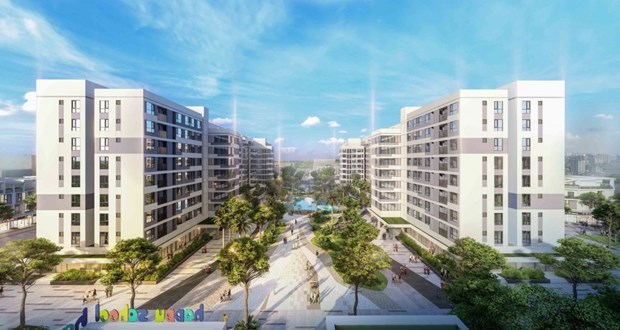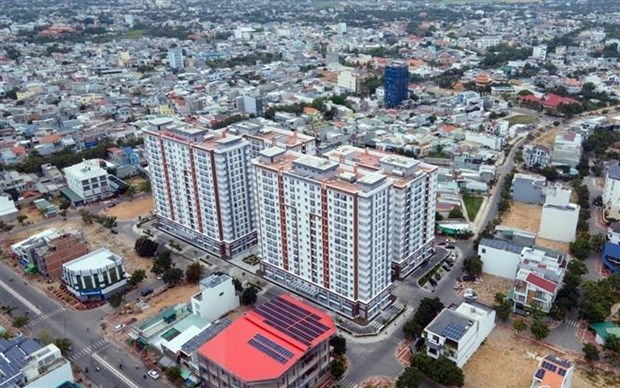At least a million social houses to be built by 2030
 Illustrative image (Photo: tuoitre.vn)
Illustrative image (Photo: tuoitre.vn)The project aims to develop affordable social and worker housing in urban areas near industrial parks and export processing zones.
The State encourages economic sectors to develop affordable housing to enable everyone to have a place to live under market mechanisms.
By 2030, the total number of completed dwellings in localities will reach about 1,062,200. Of these, about 428,000 will be finished completed by 2025 and 634,200 by 2030.
Housing construction areas properly defined
To promote the development of social and worker housing, the Ministry of Construction proposes some solutions, including improving the legal framework for social housing for low-income people and workers in industrial zones.
The ministry will study and develop a draft resolution of the National Assembly to pilot policies to promote social housing development and revise the Law on Housing 2014 to be consistent with the revised Law on Land, the revised Law on Bidding, tax laws, and guiding legal documents, including revising mechanisms and policies on social housing.
Regarding allocating land for social and worker housing, the ministry proposes amending and supplementing regulations on land for social housing development.
When formulating and approving urban planning, rural construction planning, industrial park development planning, and research and training areas planning, the competent People's Committees must identify the land area for social housing development within the provincial and district-level areas.
 Overview of a social housing project in Phan Rang-Thap Cham city. (Photo: VNA)
Overview of a social housing project in Phan Rang-Thap Cham city. (Photo: VNA)
The land fund for social housing development must be in line with each period's local planning, land use plan, and development programme. The social housing development target is considered an economic and social development target for each locality for five years or annually.
The ministry also proposes supplementing regulations on planning and land allocation for worker dormitories.
When formulating and approving industrial park planning, the land fund for worker dormitories, service buildings, and public utilities serving workers working in those industrial parks must be allocated within the commercial service land area of the industrial park.
Regarding the credit for social housing development, it is important to identify the investment in social housing development for low-income workers as an investment category in the mid- and long-term capital sources of the locality.
Amendments and supplements should be made to regulations on funding sources for housing development through new funding regulations.
This will optimise current funding sources to limit dependence on state budget, supplement the mobilisation of capital from local development investment funds for social housing development, limit the use of state budget funds for infrastructure development in the provisions of the Public Investment Law, and mobilise foreign capital for social housing development.
Huge credit programme planned
The focus is currently on coordinating with the State Bank of Vietnam to implement a credit programme worth around 120,000 billion VND (5.15 billion USD) through specific credit packages for developers and homebuyers.
The interest rates are about 1.5-2% lower than the average long-term VND loan interest rates of state-owned commercial banks (including Agribank, BIDV, Vietcombank, Vietinbank), as directed in Resolution No. 33/NQ-CP dated March 11, 2023, of the Government.
Social housing construction projects are encouraged to use social investment sources, and the regulations on the selection of social housing construction project developers should be amended and supplemented in a uniform and consistent manner with other relevant laws (investment, public investment, construction, land, and bidding).
Supplements should be made to regulations on the selection of developers for workers' dormitory construction projects in the direction that industrial park infrastructure developers simultaneously act as workers' dormitory infrastructure investors.
After investing in the infrastructure of the workers' housing area, developers can invest in building dormitories or transfer the land with infrastructure to the provincial industrial zone management board for handover to the Vietnam General Confederation of Labour or production enterprises in the industrial zone or housing business companies to invest in building dormitories for workers.
More benefits for investors
Amendments to regulations on incentives for investors will be more substantial, with 20% of commercial land area in social housing projects to be accounted for separately,
Developers of social housing projects for lease will enjoy higher reductions in value-added and corporate income taxes than those developing social housing projects for sale or lease-purchase.
Social housing projects must set aside at least 20% of the social housing area for rent. The developer is only allowed to sell this area after five years of use.
Policy beneficiaries revised
There should be mechanisms and policies to develop worker housing for rent exclusively for workers and experts working in enterprises in industrial zones, clusters, export processing zones and high-tech zones; and production enterprises in industrial zones.
Regarding solutions for implementing social housing projects, ministries and agencies will continue to review existing problems, identify causes, and propose solutions.
To ensure the target of social housing development by 2030, about 849.5 trillion VND (36.1 billion USD), mainly from private capital sources, is needed to complete 1,062,200 social and worker housing units by 2030.
It will be necessary to prioritise credit for social and worker housing projects to ensure social welfare./.












